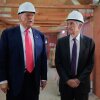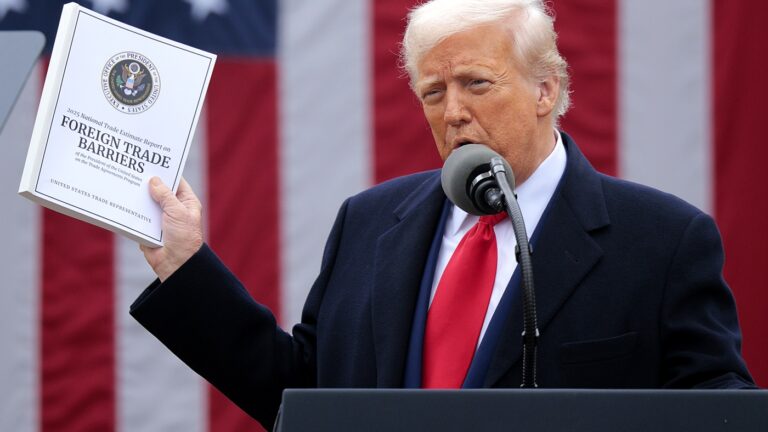President Trump holds up a report outlining foreign trade barriers while announcing steep tariffs on April 2.
Chip Somodevilla/Getty Images
hide caption
toggle caption
Chip Somodevilla/Getty Images
From businesses to Americans across the country, everybody seems worried that the economy will be hit badly if the massive tariffs threatened by President Trump go into effect this week on Aug. 1.
Yet anybody who has looked recently at their 401(k) statements or retirement accounts will have noticed something surprising: Stocks are surging. Both the S&P 500 — which represents the biggest companies in the U.S. — and the tech-heavy Nasdaq have hit a recent string of record highs.
So what gives?
Here are 4 things to keep in mind, including why some investors are still worried that things could end badly.

It’s the economy, stupid
It’s a cliché that has endured since Bill Clinton campaigned for president in 1992, but it still aptly explains why investors are sending stocks to record highs.
Despite the concerns about the impact of tariffs, the economy has held up much better than many expected.
Although inflation ticked up to 2.7% in June from a year earlier, the economy has yet to see the spike in consumer prices that some economists had initially feared.
Moreover, the labor market has held up well. Employers overall continue to hire at a solid clip, and businesses aren’t firing people, which helps explain why the unemployment rate is still at a historically low rate of 4.1%.
Investors have noticed.
“The economy has proven to be more resilient than many feared in the face of tariff threats,” says Brad Peterson, who’s the national portfolio adviser at Northern Trust, a financial firm in Chicago.

That said, most economists still expect the U.S. economy to grow at a slower pace in the second half of the year than in 2024, with the chance of a recession seen at 33% in the next 12 months, according to the latest quarterly survey from The Wall Street Journal.
Companies are still reporting decent profits
Here’s the other thing investors on Wall Street like: Corporate earnings are proving sturdier than what many in the markets had initially feared. And even though they aren’t blockbuster results, investors seem relieved.
Companies such as Alphabet (the parent company of Google), Netflix, AT&T and Hasbro beat Wall Street expectations. And they are also sounding more optimistic about their outlook. For instance, Delta Air Lines said travelers are feeling more confident despite the tariff uncertainty.
The earnings reflect a strange disconnect the U.S. is experiencing: Americans may still feel concerned about their future, yet they continue to spend — and that’s helping the corporate bottom lines.
“We may feel bad. We may feel concerned, but the hard data would suggest our behavior is something else entirely,” says Amanda Agati, the chief investment officer for PNC Asset Management Group in Philadelphia.
But there are sectors that are struggling more than others. General Motors announced a $1.1 billion hit to its profit because of higher tariffs — it’s still worth noting that the company was profitable.

Automakers are especially concerned about the prospect of tariffs. General Motors reported a $1.1 billion hit to its latest quarterly profit.
Bill Pugliano/Getty Images
hide caption
toggle caption
Bill Pugliano/Getty Images
And small businesses will be hit far more than large companies as tariffs hit the economy.
“When you think about small businesses in the country,” says Kevin Gordon, a senior investment strategist at the Schwab Center for Financial Research in New York, “they struggle a lot more from higher tariffs because they just don’t have the kind of flexibility or the cash balances that large companies do to be able to combat it.”
Trump’s bark may be worse than his bite on tariffs
When Trump first announced his round of tariffs in early April, hitting just about every country on planet Earth, stocks took a nosedive as investors discovered his import taxes were far higher than most had predicted.
But stocks rebounded sharply after Trump then announced a 90-day pause — which has now been extended a second time to Friday. The president did retain the baseline 10% tariff on just about everything the U.S. imports, while imposing other tariffs on some items such as steel and aluminum.
This delay on additional sweeping tariffs has led the market to believe in the “TACO trade,” short for “Trump Always Chickens Out,” a phrase coined and popularized by a Financial Times opinion columnist.
It’s a term that Trump dislikes, but it speaks to a belief among investors that the president’s actions will ultimately not be as drastic as he first implied.

For example, Trump last week announced a trade deal with Japan, saying the U.S. will impose a 15% tariff on imports from Asia’s second-largest economy, a rate that just last year would have likely alarmed investors.
Yet in a world where Trump has upended expectations, investors reacted with relief because it’s lower than the 25% he had first announced. In fact, the new tariff helped send the S&P 500 to yet another record high.
In other words, Trump has managed to reset market expectations by first announcing very high tariffs and then imposing comparatively lower ones in a few trade deals. In doing so, he has reshaped how investors have come to approach tariffs.

Japanese Prime Minister Shigeru Ishiba explains the contents of the tariff agreement with the U.S. to reporters in Tokyo on July 23.
STR/Jiji Press/AFP via Getty Images
hide caption
toggle caption
STR/Jiji Press/AFP via Getty Images
Analysts are hopeful that at these lower levels, the global economy may be able to better withstand the tariffs.
“We live in a new normal where 10% is the new zero and so 15% and 20% doesn’t seem so bad if everyone else got it,” Trinh Nguyen, senior economist for emerging Asia at Natixis, posted on X, referencing an interview she gave to Bloomberg.
But fears remain about the other shoe that may drop
Even though stocks are at record highs, there’s still a palpable fear among some market experts that investors may have gotten the tariff situation all wrong.
Although Trump has announced a handful of deals with some countries, the most important ones still remain, including those with the United States’ largest trading partners — Mexico, Canada and China.
And then there’s the economic impact. Although investors are relieved import duties so far haven’t been as bad as initially feared, the average tariff rate is still at the highest it has been since the 1930s. The cost of imports will be higher, and prices that consumers pay will rise. That will end up having an inevitable impact both on economic growth and on inflation, even if the U.S. is not seeing the full effects just yet.
It’s not just tariffs, though. Other uncertainties loom, most prominently Trump’s relentless attacks against Federal Reserve Chair Jerome Powell.


Though Trump has indicated he won’t seek to fire Powell for now — a step that would set up a big legal fight and roil financial markets — he continues to attack both the Fed and Powell.
And stocks are expensive, meaning they are vulnerable to big falls if something unexpected happens.
Sandy Villere, a partner and portfolio manager at Villere & Co. in New Orleans, says markets could fall by 10% to 12% from current levels in the second half of the year.
“Everybody’s assuming everything’s going to be perfect,” he says. “That’s usually where you get the pullback. When things are priced for perfection, we get nervous.”
That’s the ultimate concern. Stock markets are priced for perfection — and the higher markets go, the higher the chance it could potentially end in tears.
